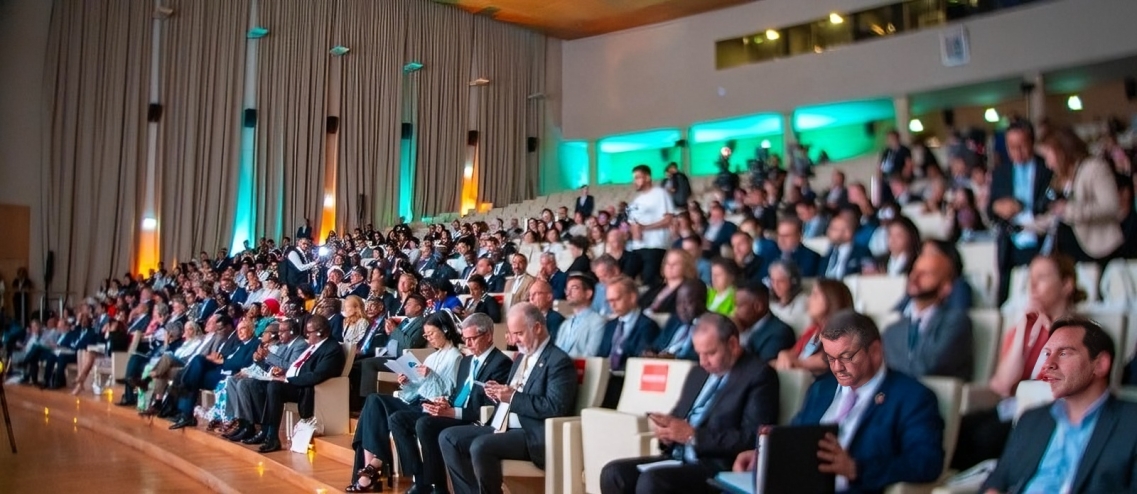Paris Peace Forum Urges Swift Climate Action and North-South Equity
Benguerir, Morocco - The Paris Peace Forum, renowned for fostering global governance and cooperation, held its Spring Meeting outside Europe for the first time, choosing the University Mohammed VI Polytechnic (UM6P) in Morocco as its venue. The event underscored the pressing need for equitable solutions to global issues, with a distinct focus on the disparities between the Global North and South.
A Platform for Global Solutions
The Paris Peace Forum, a French non-profit organization, annually convenes world leaders and civil society to address global challenges through policy initiatives and multi-stakeholder projects. This year’s theme, “Fair Transitions,” emphasized the interconnected crises of climate change, global health, and geopolitical conflicts, spotlighting the stark inequalities between different regions of the world.
Advocating for a Global Carbon Tax
The panel titled “Solving the Joint Climate Transition and Development Conundrum through Enhanced North-South Cooperation” was a centerpiece of the forum. Moderated by Mariana Campos, Director of Mexico Evalua, the panel featured prominent voices such as Mo Ibrahim, Founder and Chair of the Mo Ibrahim Foundation, who delivered a poignant critique of the global community's priorities.
“We are spending more on arms than on financial aid, even as we face existential threats. This is not sustainable,” Ibrahim declared. He highlighted the severe impact of climate change on Africa, citing annual GDP losses between $48-50 billion. “Those who caused the problem need to take responsibility,” he asserted, proposing a global carbon tax as a serious measure to address the climate crisis. “A carbon tax is the only serious way to address the climate crisis. Those emitting the most must pay the most,” he stated, criticizing the inadequate and often hypocritical climate funds from major polluters.
Bridging Investment Gaps
Lionel Zinsou, Co-founder of SouthBridge and former Prime Minister of Benin, provided a nuanced perspective, acknowledging both challenges and progress in Africa's energy and agricultural transitions. “Despite geopolitical tensions, significant advancements are happening in Africa,” Zinsou noted. He emphasized the need to reshape perceptions of risk associated with investing in Africa and called for multilateral institutions to bridge the trust gap and unlock private investment.
“Africa presents numerous profitable opportunities for sustainable development,” Zinsou argued. He stressed the importance of mobilizing private investment to support capital-intensive projects in Africa, advocating for a new narrative that recognizes the continent’s abundant resources and opportunities.
Redefining Fair Transitions
Nisreen Elsaim, Former Chair of the UN Secretary-General’s Youth Advisory Group on Climate Change, brought a youth perspective, challenging the concept of “fair transition” from an African viewpoint. “For many Africans, the transition means gaining access to basic services like electricity. Less than 40% of the continent has access,” she noted.
Elsaim critiqued the traditional North-South dynamic, advocating for genuine partnerships that foster mutual growth rather than dependency. Using the metaphor of a tree providing unequal access to apples, she called for justice that addresses systemic inequalities. “The tree today bends towards the West. We need to ensure it stands upright, providing equally for all. This is what fair transition means,” she emphasized.
Collective Action for a New Framework
Rémy Rioux, Chief Executive Officer of Agence Française de Développement (AFD), echoed the urgency for a new global framework. He highlighted the significance of the forum's location in Morocco, a country actively engaged in African development and global governance.
Rioux acknowledged the frustrations expressed by Mo Ibrahim but emphasized the need for collective efforts to build a robust financial framework that addresses both climate and development needs. “Discussing these issues in Benguerir is crucial. We need a new framework that combines public and private financing, protects the most vulnerable, and leverages private investments to reduce greenhouse gas emissions and protect nature,” Rioux said. He underscored the critical role of public development banks in this agenda, noting their substantial influence in global investment.
Towards Inclusive Dialogue
The Paris Peace Forum’s decision to hold its Spring Meeting in Morocco marks a significant shift towards inclusive dialogue, integrating voices from the Global South into crucial global discussions. The forum emphasized the urgent need to rethink global cooperation frameworks to ensure equitable climate action and sustainable development.
The call for a global carbon tax, the push for private sector involvement in African development, and the demand for justice in climate transitions collectively underscored the necessity for systemic change. As the forum concluded, it left a resonant message: equitable solutions are not just desirable but essential for a sustainable future.

Lire aussi
Latest News
- Yesterday 19:08 Moroccan Star Manal Challenges Social Norms with 'Cabaret'
- Yesterday 13:10 Moroccan Artistry Takes Center Stage at Paris Design Week 2024
- Yesterday 13:00 Dick Cheney Crosses Party Lines: Endorses Kamala Harris for President
- Yesterday 12:45 Moroccan Expats in Italy Face Ongoing Driver's License Hurdles Despite New Agreement
- Yesterday 12:30 Super Typhoon Yagi Ravages Northern Vietnam: Major Disruptions and Widespread Damage
- Yesterday 12:13 China Unveils $50 Billion Plan to Boost Africa's Development at FOCAC 2024
- Yesterday 12:00 French Left Protests Michel Barnier's Appointment as Prime Minister



